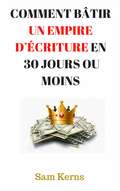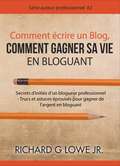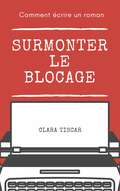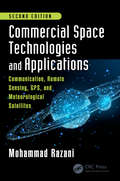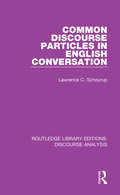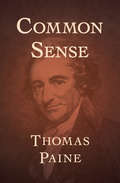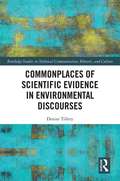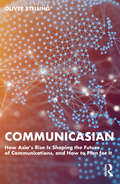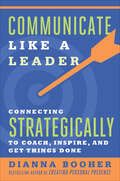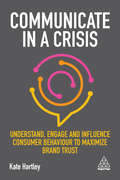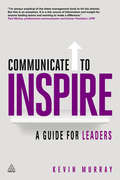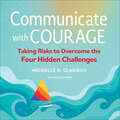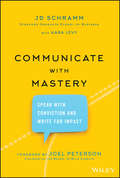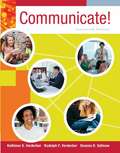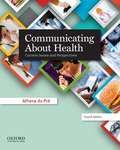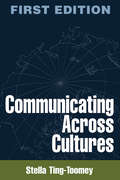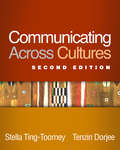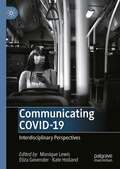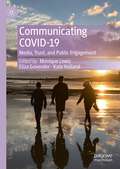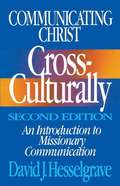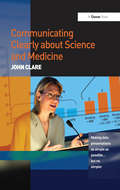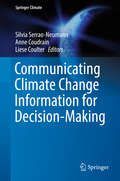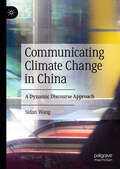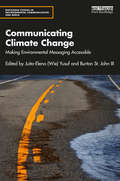- Table View
- List View
Comment bâtir un empire d’écriture en 30 jours ou moins
by Laura Dinraths Sam KernsVous voulez vraiment gagner votre vie en tant qu’écrivain ? Alors vous allez devoir oublier tout ce que vous savez ! Laissez-moi deviner – vous êtes un auteur talentueux et prêt à tout faire pour gagner votre pain en écrivant. Vous avez lu d’innombrables articles et livres sur le sujet, suivi leurs suggestions, mais ne semblez pas parvenir à augmenter vos revenus. Ou alors vous êtes un écrivain débutant convaincu que quelque chose vous échappe car votre propre expérience ne correspond pas du tout à ce que d’autres affirment possible. Ou peut-être que ça fait des années que vous travaillez comme écrivain freelance amateur, et vous êtes convaincu qu’il est tout simplement impossible de quitter votre ‘vrai’ boulot pour faire ce que vous aimez à plein-temps. Laissez-moi vous confier un secret. On vous a menti. Oui, vous m’avez bien entendu. MENTI. La vérité, c’est que seuls 10 pourcents des écrivains gagnent suffisamment en écrivant à temps plein pour subvenir à leurs besoins. Dix pourcents. Ce n’est pas quelque chose que les autres livres sur ‘comment écrire’ abordent en détail, si ? Heureusement, il existe une solution. Je le sais parce que ça fait des années que je la pratique. Mais afin de réussir dans ce métier, vous allez devoir renverser votre modèle de l’écrivain freelance. En fait, vous allez devoir jeter presque tout ce que vous savez par la fenêtre. Je veux parler d’un nouveau système. D’un système qui ne limite pas la capacité à gagner sa vie d’un écrivain à des contraintes de temps. Je veux parler de gagner des revenus dont tout le monde serait fier. Dans mon nouveau livre, je vais vous montrer comment créer votre propre empire d’écriture en 30 jours ou moins. Vous apprendrez : •Pourquoi la plupart des freelances ne gagnent pas bien leur vie – et que faire pour changer ça •Com
Comment écrire un Blog, Comment gagner sa vie en Bloguant
by Richard G Lowe Jr Laura DinrathsC’est un art d’écrire un article qui encourage le lecteur à prendre la décision d’agir. Voici la vision étroite du livre que vous lisez en ce moment sur votre Kindle. Vous apprendrez à créer un article qui intéresse le lecteur, l’interpelle, l’informe, et l’entraîne à prendre une décision à la fin de sa lecture. Le livre que vous lisez pour le moment décrit la méthode que j’utilise pour créer des articles de blogs dont l’intention spécifique est de pousser le lecteur du moment où il clique sur le lien jusqu’à ce qu’il clique sur le bouton ‘acheter’ ou ‘souscrire’ au bas de la page. Vous apprendez : * Comment créer un titre qui attire des lecteurs vers votre article * Quoi inclure au-dessus de la ligne de flottaison * Comment ajouter des déclencheurs émotionnels * Comment pousser vos lecteurs à partager votre article * Quelles autres informations inclure dans le texte * Comment les pousser à cliquer sur ‘acheter’ * L’importance des bonnes images * L’intérêt des vidéos
Comment écrire un roman: Surmonter le blocage
by Sophie Martin Clara TiscarVous avez envie d’écrire ? Vous avez déjà eu l’impression d’être bloqué ? Vivez-vous l’angoisse de la page blanche ? Ce livre est fait pour vous si vous vous reconnaissez dans l’une des situations suivantes : ✓ J’ai envie d’écrire, mais je ne trouve pas le moment de le faire. ✓ Je suis bloqué, je ne sais pas comment continuer mon roman. ✓ Je sais quelle histoire je souhaite raconter, mais je n’arrive pas à l’écrire. ✓ Je ne suis pas vraiment bloqué, mais je manque de motivation pour continuer d’écrire mon roman. Conçu comme un guide de référence pratique et interactif, cet ouvrage vous offre méthodes et ressources pour surmonter l'angoisse de la page blanche et éviter le blocage de l'écrivain.
Commercial Space Technologies and Applications: Communication Remote Sensing Gps And Metrological Satellites Second Edition
by Mohammad RazaniThis new edition introduces and examines the space technologies that benefit our everyday lives. Each chapter now includes exercises and problems, and the content covers new satellites and emerging technologies. It explores the ever-improving quality of satellite systems and services, and also investigates ways to bring about higher resolution satellite imagery and lower satellite costs. The focus is on man-made satellites, which are becoming smaller, smarter, cheaper, and easier to launch, having a longer life span, and are less susceptible to interference. Furthermore, the book considers advances in several key technologies that affect the satellite industry. Includes extensive study questions and exercises after each chapter. Explains present commercial space technology and its future outlook. Explores the many applications of space technologies and their impact on our lives, including real world examples. Presents a future outlook on robotics, communications and navigation, and human health and nanotechnology. Provides a clear understanding of space, space technologies, space applications, space security, space regulations, a space roadmap, and their impact on the lives of humans now and for generations to come.
Common Discourse Particles in English Conversation (RLE: Discourse Analysis)
by Lawrence C. SchourupFirst published in 1985, this book studies several common items in English conversation known variously as ‘discourse particles’, ‘interjections’, ‘discourse markers’, and, more informally, ‘hesitations’ or ‘fillers’. While the analysis primarily focuses on ‘like’, ‘well’ and ‘you know’, the larger concern is the entire set of items of which these are members and as such ‘I mean’, ‘now’, ‘oh’, ‘hey’, and ‘aha’ are also examined. These discourse particles are analysed at length and then a framework is proposed in which their use individually makes sense and allows revealing comparisons to be made between them. This book will be of interest to students of linguistics
Common Sense
by Thomas PaineThe rousing argument for independence that inspired a nation Published anonymously in 1776, this landmark political pamphlet spread across the colonies more rapidly than any document of its kind ever had before. Its words were read aloud in town squares, its pages affixed to tavern walls. Both a clear-eyed, plainly stated case for separation from Great Britain and a stirring call to action, Common Sense sparked the imagination of a fledgling nation and played a decisive role in the march toward revolution. Thomas Paine’s masterpiece is crucial reading for any student of American history. This ebook has been professionally proofread to ensure accuracy and readability on all devices.
Commonplaces of Scientific Evidence in Environmental Discourses (Routledge Studies in Technical Communication, Rhetoric, and Culture)
by Denise TilleryThis book focuses on the uses of scientific evidence within three types of environmental discourses: popular nonfiction books about the environment; traditional and social media texts created by a grassroots environmental group; and a set of data displays that make arguments about global warming in a variety of media and contexts. It traces the operations of eight commonplaces about science and shows how they recur throughout these contexts, starting with Rachel Carson’s Silent Spring and ending with contemporary blogs and social media. The commonplaces are shown to embed ideological assumptions and simultaneously challenge those assumptions. In addition, the book addresses the potential dangers involved in relying too heavily on aspects of these commonplaces, and how they can undermine the goals of some of the writers who use them.
CommunicAsian: How Asia's Rise Is Shaping the Future of Communications, and How to Plan for It
by Oliver StellingThe rise of Asia has changed the world, now shaped by greater global connectivity, geopolitics and shifting spheres of influence. Tapping into research and decades of experience in the world’s fastest-moving markets, this book makes a compelling case for a new and future-ready approach to communications planning and implementation, which the Asian Century demands. Facing a new operating environment, policymakers and business leaders have to act quickly. This book outlines the necessary adjustments to long-established practices and value propositions in both corporate and government communications and provides a step-by-step plan for strategy development, laid out in a two-pronged approach designed to appeal to a multicultural audience. It is an essential read for global practitioners and students in international relations and mass communications.
Communicate Like a Leader: Connecting Strategically to Coach, Inspire, and Get Things Done
by Dianna Booher John Britt Ed Jent&“Great leaders are great communicators…If you want to become a top-notch strategic communicator, you&’d do well to heed the advice in [this book&’s] pages.&” —Marshall Goldsmith, New York Times-bestselling author of What Got You Here Won&’t Get You ThereAn Axiom Awards Silver Medal Winner People often get promoted to leadership positions without knowing how to communicate an inspiring strategic vision to the people who report to them. So they focus on what they know: tactics, not strategy. As a result, they become stuck in micromanagement mode—driving people away instead of drawing them in. Dianna Booher wants to prevent micromanagement before it happens by providing you with the right leadership communication skills. Grounded in extensive research, this book offers practical guidelines to help professionals think, coach, converse, speak, write, meet, and negotiate strategically to deliver results. In thirty-six brief chapters, Booher shows you how to communicate effectively to audiences up and down the organization so you can fulfill your most essential responsibilities as a leader. &“If you&’re a micromanager, you need to know it&’s not just ineffective—it&’s also the most labor-intensive leadership style. When you read Communicate like a Leader, you&’ll learn strategic communication skills that will improve your relationship with your people and actually make leading easier.&” —Ken Blanchard, New York Times-bestselling coauthor of The New One Minute Manager
Communicate in a Crisis: Understand, Engage and Influence Consumer Behaviour to Maximize Brand Trust
by Kate HartleyCommunicate in a Crisis is the definitive guide for any PR or marketing professional to recognize, plan and respond to a sudden wildfire of consumer-led reaction, 'manipulated outrage' sparked from interaction on news feed algorithms, fuelled by social media and the constant demand for an instantaneous response.This book turns the traditional crisis management approach on its head, starting by understanding changing consumer behaviours and the new 'threat' for brands, then outlining practical steps to prepare, synchronize and execute a coordinated brand response across all channels - under pressure. It reveals why we love to hate our favourite brands, how to recognize a day to day problem from a crisis, and offers valuable advice, such as using influencers and brand advocates to address social media trolls, rumours and the impact of fake news. With unique case studies, interviews and anecdotes from global leaders, Communicate in a Crisis will embed a bottom-up culture of long-term reputation management, always ready to face the unexpected.
Communicate to inspire
by Kevin MurrayCommunicate to Inspire answers some of the key practical questions for becoming a better leader, such as: "How do you learn to be yourself, better?" and "What should you examine and how should you articulate your own purpose and values?" Kevin Murray presents a model that charts the leadership process and draws stories from his experience coaching leaders. This book offers principles of leadership communication that address: how to become more audience-centric; how to emphasize values; how to focus on the people leaders need to inspire; what methods and tools to use to try to see the world through their eyes and address their needs; and mastering the art of public speaking. Communicate to Inspire uses charts and information gathered from dozens of successful training programs to determine how to turn a department, division or company into a better listening, faster responding, more innovative entity, just by holding more and better structured conversations.
Communicate with Courage: Taking Risks to Overcome the Four Hidden Challenges
by Michelle D GladieuxConfront the psychological blocks that are holding you back—and become a fearless and peerless communicator. Winner of the 2023 PenCraft Best Book Award for Nonfiction, 2023 Nonprofit Authors Association Silver Award, 2023 Readers&’ Favorite Bronze Medal Award for Business, and 2023 Dan Poynter&’s Global Ebook Gold Award for Communications As a lifelong communication coach, Michelle Gladieux has discovered the four sneaky obstacles that can keep you from becoming an effective communicator:Hiding—Fearing your low self-confidence will expose your supposed weaknessesDefining—Putting too much stock into your assumptions and being quick to judge right and wrongRationalizing—Using &“being realistic&” to shield yourself from taking chances, engaging in conflict, or doing other scary but potentially rewarding actionsSettling—Stopping at good enough instead of pushing for something better What all these challenges have in common is they require taking risks—to reveal yourself, to question your beliefs, to take a leap of faith, or to move out of your comfort zone. As a response, each chapter includes a Pro Move, or a best practice, and an exercise designed to help you overcome your fears and become a powerful communicator. Courageous communication requires self-knowledge, practice, and a fierce desire to continually improve; this book is like having an expert coach along with you for every step of the journey. &“[A] wonderful book.&” —Karl W. Einolf, PhD, President, Indiana Institute of Technology
Communicate with Mastery: Speak With Conviction and Write for Impact
by JD SchrammDevelop your leadership communication Communicating with Mastery provides readers with a rich treasure trove of frameworks and tools for leadership communication as developed and taught over the past decade at Stanford's Graduate School of Business. Designed for the business leader on the go, it provides you quick access to helpful approaches to vexing communication problems leaders face today in speaking and writing to various audiences. Projects often fail not because of the vision, but in the articulation of that vision. With the help of this book, you’ll learn how to ensure you get the results you desire as a leader and communicator including: Speak with conviction and write with impact Tailor your communication to any goal, setting, or audience Scale your leadership through effective coaching Every time you write or speak, you need to make your words count. And this book shows you how.
Communicate! (Fourteenth Edition)
by Rudolph F. Verderber Kathleen S. Verderber Deanna D. SellnowNow in its 14th edition, this ground-breaking, market-leading fundamentals of human communication text helps readers improve their communication competency by becoming proficient in using theory and research-grounded communication skills. Praised for its clear and concise writing style, this new edition includes increased coverage of how technology and social media are changing communication practices and offers guidelines for best practice. Lively contemporary examples and sample speeches ground theory, increase comprehension, and help readers become skillful communicators. COMMUNICATE! engages students in active learning through theory, application and skill-building exercises including speech action step activities that guide students through the speech preparation process. The role of ethics in communication is integrated throughout the text, and students can also apply ethical principles to case situations.
Communicating About Health: Current Issues And Perspectives, 4th Edition
by Athena DupréAn ideal combination of communication theory and practical advice, Communicating About Health: Current Issues and Perspectives, Fourth Edition, is an indispensable resource for readers looking to improve their communication abilities in the health care field. Written by Athena du Pre - anexperienced researcher and noted scholar - the text offers an excellent balance of theory and practice; research and pedagogy; coverage of patient/caregiver issues; and material on the current, historical, and philosophical backgrounds of communication in health care. In addition to enhancingfeatures found in the previous edition, this new edition includes a greater emphasis on theory, narrative, and technology in order to reflect changes in the health industry.
Communicating Across Cultures
by Stella Ting-ToomeyFrom high-level business negotiations to casual conversations among friends, every interpersonal interaction is shaped by cultural norms and expectations. Seldom is this more clearly brought to light than in encounters between people from different cultural backgrounds, when dissimilar communication practices may lead to frustration and misunderstanding. This thought-provoking text presents a new framework for understanding the impact of culture on communication and for helping students build intercultural communication competence. With illustrative examples from around the globe, the book shows that verbal and nonverbal communication involves much more than transmitting a particular message it also reflects each participant's self-image, group identifications and values, and privacy and relational needs. Readers learn to move effectively and appropriately through a wide range of transcultural situations by combining culture-specific knowledge with mindful listening and communication skills. Throughout, helpful tables and charts and easy-to-follow guidelines for putting concepts into practice enhance the book's utility for students.
Communicating Across Cultures, Second Edition: Esl Learners In The Non-esl Classroom (The\guilford Communication Ser.)
by Stella Ting-Toomey Tenzin DorjeeThis highly regarded text--now revised and expanded with 50% new material--helps students and professionals mindfully build their knowledge and competencies for effective intercultural communication in any setting. The authors' comprehensive, updated theoretical framework (integrative identity negotiation theory) reveals how both verbal and nonverbal communication are affected by multilayered facets of identity. Written in a candid, conversational style, the book is rich with engaging examples illustrating cultural conflicts and misunderstandings that arise in workplace, educational, interpersonal, and community contexts. Readers learn how to transform polarized conversations into successful intercultural engagements by combining knowledge about culture with mindful listening and communication skills. New to This Edition *Extensively revised to reflect the ongoing development of integrative identity negotiation theory, nearly 20 years of research advances, the growing diversity of the United States, and global trends. *Chapter providing a mindfulness lens on intercultural and intergroup communication competence. *Chapter on culture shock in sojourners (international students, global businesspeople, and others). *Chapter on immigrants' acculturation processes. *Lively chapter-opening case examples, including compelling personal stories from the authors and others from diverse cultures. *End-of-chapter summaries, "Mindful Guidelines" to put into practice, and critical thinking questions. *New and expanded discussions of hot topics: cross-cultural workplaces, community building, peace building, romantic relationships, prejudice and discrimination, microaggressions, and ethical issues.
Communicating Affection
by Kory FloydExplores how and why people express affection, the many positive effects it can have, and the risks it often carries.
Communicating COVID-19: Interdisciplinary Perspectives
by Kate Holland Monique Lewis Eliza GovenderThis book explores communication during the first year of the COVID-19 pandemic. Featuring the work of leading communication scholars from around the world, it offers insights and analyses into how individuals, organisations, communities, and nations have grappled with understanding and responding to the pandemic that has rocked the world. The book examines the role of journalists and news media in constructing meanings about the pandemic, with chapters focusing on public interest journalism, health workers and imagined audiences in COVID-19 news. It considers public health responses in different countries, with chapters examining community-driven approaches, communication strategies of governments and political leaders, public health advocacy, and pandemic inequalities. The role of digital media and technology is also unravelled, including social media sharing of misinformation and memetic humour, crowdsourcing initiatives, the use of data in modelling, tracking and tracing, and strategies for managing uncertainties created in a pandemic.
Communicating COVID-19: Media, Trust, and Public Engagement
by Kate Holland Monique Lewis Eliza GovenderThis edited collection, follows on from 'Communicating COVID-19: Interdisciplinary Perspectives' (2021) and brings together different scholars from around the world to explore and critique the ongoing advances of communicating COVID, two years into the pandemic. Pandemic life has become familiar to us, with all its disruptions and uncertainties. In the second year of COVID, many societies emerged well attuned to new waves of infections, while others, having initially demonstrated 'gold standard' responses, regressed, either through a premature end to public health restrictions or challenges around vaccine rollouts. In many countries, bitter social divisions have arisen over mask-wearing, lockdowns, quarantine and vaccination. To better understand the ever evolving communicative landscape of COVID-19, this collection shares updated perspectives from the disciplines of media and communication, journalism, public health and primary care, sociology, and political and behavioural science, addressing the major issues that have confronted communicators, including vaccine hesitancy, misinformation, and the mobilisation of community driven communication responses as restrictions eased in various parts of the world.
Communicating Christ Cross-Culturally: An Introduction to Missionary Communication
by David HesselgraveThis revised edition of Dr. David Hesselgrave's great work Communicating Christ Cross-Culturally updates the original edition and interacts with the most recent literature on this increasingly important topic. The original edition went through fifteen printings and, very deservedly, has come to be one of the most widely used textbooks on Christian cross-cultural communications. The revisions in this new edition are extensive and carry on the high level of discussion maintained throughout the original edition, taking into account, for example, the current discussion on the relationship between form and function and the enormous body of literature that has sprung up recently on contextualization. To enhance the volume's usefulness for students, Dr. Hesselgrave has added an extensive bibliography of twenty-five pages on various aspects of cross-cultural communications. This revision of Communicating Christ Cross-Culturally is superb. It raises a great book into a unique category, undoubtedly the finest book on this topic available today.
Communicating Clearly about Science and Medicine: Making Data Presentations as Simple as Possible ... But No Simpler
by John ClareScientific communication is challenging. The subject matter is complex and often requires a certain level of knowledge to understand it correctly; describing hazard ratios, interpreting Kaplan Meier curves and explaining confounding factors is different from talking about a new car or clothing range. Processes, for example in clinical trials, are laborious and tedious and knowing how much of the detail to include and exclude requires judgement. Conclusions are rarely clear cut making communicating statistical risk and probability tough, especially to non-statisticians and non-scientists such as journalists. Communicating Clearly about Science and Medicine looks at these and many more challenges, then introduces powerful techniques for overcoming them. It will help you develop and deliver impactful presentations on medical and scientific data and tell a clear, compelling story based on your research findings. It will show you how to develop clear messages and themes, while adhering to the advice attributed to Einstein: 'Make things as simple as possible...but no simpler.' John Clare illustrates how to communicate clearly the risks and benefits contained in a complex data set, and balance the hope and the hype. He explains how to avoid the 'miracle cure' or 'killer drug' headlines which are so common and teaches you how to combine the accuracy of peer-to-peer reviewed science with the narrative skills of journalism.
Communicating Climate Change Information for Decision-Making (Springer Climate)
by Silvia Serrao-Neumann Anne Coudrain Liese CoulterThis book provides important insight on a range of issues focused on three themes; what new climate change information is being developed, how that knowledge is communicated and how it can be usefully applied across international, regional and local scales. There is increasing international investment and interest to develop and communicate updated climate change information to promote effective action. As change accelerates and planetary boundaries are crossed this information becomes particularly relevant to guide decisions and support both proactive adaptation and mitigation strategies. Developing new information addresses innovations in producing interdisciplinary climate change knowledge and overcoming issues of data quality, access and availability. This book examines effective information systems to guide decision-making for immediate and future action. Cases studies in developed and developing countries illustrate how climate change information promotes immediate and future actions across a range of sectors.
Communicating Climate Change in China: A Dynamic Discourse Approach
by Sidan WangThis book explores how China's media narrate climate policy and climate change. With the rapid growth of economy and carbon emissions, China has been seen as having a key role in addressingclimate change and receives substantial attention from the media. In theChinese coverage, climate change issues can be interpreted as various concernsand ideas involving the dimensions of the economy, energy and emissions, publicinvolvement, science and ecology, and responsibility. In this sense, a discourseapproach can be used to understand how the newspapers construct the climatechange discourse and discourse networks in the coverage. This study selectsthree different newspapers in China, namely People’sDaily, China Daily and Southern Weekend. This book will interest scholars of Chinese politics, environmentalists, and media studies scholars.
Communicating Climate Change: Making Environmental Messaging Accessible (Routledge Studies in Environmental Communication and Media)
by Juita-Elena Wie Yusuf And Burton St. John IIIThis edited collection focuses on theoretical and applied research-based observations concerning how experts, advocates, and institutions make climate change information accessible to different audiences. Communicating Climate Change concentrates on three key elements of climate change communication – access, relevance, and understandability – to provide an overview of how these aspects allow multiple groups of stakeholders to act on climate-related information to build resilience. Featuring contributions from a wide range of scholars from across different disciplines, this book explores a multitude of different scenarios and communication methods, including social media; public opinion surveys; participatory mapping; and video. Overall, climate change communication is addressed from three different perspectives: communicating with the public; communicating for stakeholder engagement; and organizational, institutional, risk, and disaster communication. With each chapter focusing on implications and applications for practice, this book will be of great interest to students and researchers of climate change and environmental communication, as well as practitioners interested in understanding how to better engage stakeholders through climate change-related communication.
